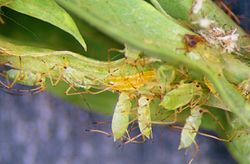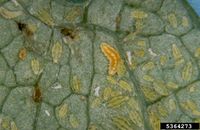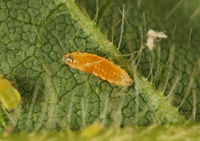Difference between revisions of "Aphidoletes aphidimyza (predator)"
From Pestinfo-Wiki
| Line 1: | Line 1: | ||
{{TaxLinks|LnkAphidoletesPredators}} | {{TaxLinks|LnkAphidoletesPredators}} | ||
| − | {{ | + | {{LiteratureDBY|{{PAGENAME}}|138|browse,Ccountrylnk,PhostsP}} |
[[File:Predatory midge.jpg|250px|thumb|''Aphidoletes aphidimyza'' larva feeding on pea aphids (click on image to enlarge it)<br/>Author(s): Whitney Cranshaw, Colorado State University<br/>Source: [http://commons.wikimedia.org/wiki/File:Predatory_midge.jpg Wikimedia Commons]]] | [[File:Predatory midge.jpg|250px|thumb|''Aphidoletes aphidimyza'' larva feeding on pea aphids (click on image to enlarge it)<br/>Author(s): Whitney Cranshaw, Colorado State University<br/>Source: [http://commons.wikimedia.org/wiki/File:Predatory_midge.jpg Wikimedia Commons]]] | ||
<font color="#008000">'''''Aphidoletes aphidimyza'' (predator)'''</font> (Rondani, 1847) | <font color="#008000">'''''Aphidoletes aphidimyza'' (predator)'''</font> (Rondani, 1847) | ||
Latest revision as of 20:00, 2 December 2022
| Literature database |
|---|
| 98 articles sorted by: |
| • year (descending) |
| • research topics |
| • countries/regions |
| • list of pest species |

Aphidoletes aphidimyza larva feeding on pea aphids (click on image to enlarge it)
Author(s): Whitney Cranshaw, Colorado State University
Source: Wikimedia Commons
Author(s): Whitney Cranshaw, Colorado State University
Source: Wikimedia Commons
Aphidoletes aphidimyza (predator) (Rondani, 1847)
The gall midge is an important predator of aphids with a cosmopolitan distribution in temperate and subtropical regions. The female midges lay up to 40 eggs eggs on leaves close to aphid colonies and the larvae prey on a large variety of aphid species. Unlike many other aphid predators, A. aphidimyza larvae live within aphid colonies. The aphids do not recognize them as enemies and do not release an alarm pheromone when attacked.
A. aphidimyza is produced commercially and has been used in greenhouses since the 1970s, sometimes in combination with the aphid parasitoid Aphelinus abdominalis. Colonies can be maintained in greenhouses using banker plants.
- Other images of Aphidoletes aphidimyza (Wikimedia Commons - click to enlarge)

